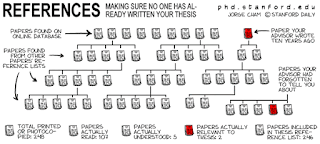Presently, many commercial and free citation management tools have emerged in the market. These software packages have their advantages and disadvantages. And of course, there is a bit of learning curve for each one of them. So, lets get on with our job of putting them together on one page! This is not the most thorough analysis and just based on my personal preference. Please pick the one you are most comfortable with and go on.
EndNote:
Proprietary Software from Clarivate Analytics
I have used EndNote from the very beginning in my college days until now. It is very reliable but doesn't have necessarily the best features. They release a new version every year. If your university has a subscription, it is worth having it. EndNote works best if you have not formed your library yet and are going to start fresh. I have had many problems with pdfs which I had already downloaded and making a working citation library out of them. It is well-established in the market so if you are downloading the citations from Web of Science and other related websites, you will get a standard citation format. It is easy to change citation styles and integrating it with MS Office. The pdf reader is a bit old-school and difficult to access as it is on the second tab of a reference.
Mendeley:
Free standard package with premium features at a cost
This software is amazing in terms of the importing pdfs and finding the relevant metadata. This works best if you already have downloaded different articles and want to bookmark them with their citations. They also have very good integration with MS Office and there is a good pdf reader with highlighting capabilities.
JabRef :
Open Source
Best for citation management using bib files and made specifically for the Latex bibliography management.Although it is a bit outdated and interface is not user friendly, but it helps in getting work done. You can very easily generate a bib file with auto-generated bibkeys.
This reference manager manages references along with a mindmap. It helps you find the connections between a number of references and understand what has been done and find the things which have not been done. This is for the super-organized researchers who need to know and track their references to do some Sherlock Holmes kind of reasoning as to why a particular topic needs to be explored.
You will find more details here :
Comparison between some reference managers
Zotero : Best for website bookmarking, storing online references, pdfs etc. Works best for people with extensive browser based research. The reference manager resides in your browser as an extension.
Allows to create citations in Word and OpenOffice and also tag your research. Also allows for collaboration







